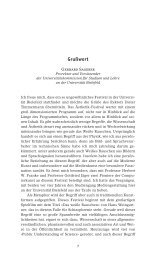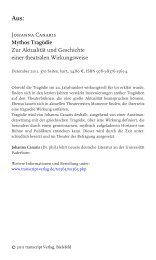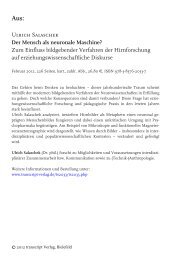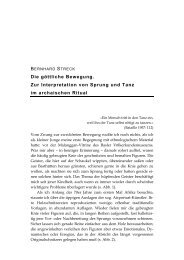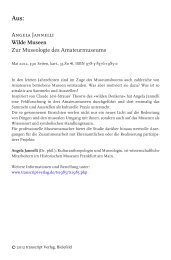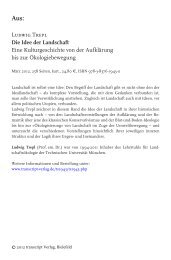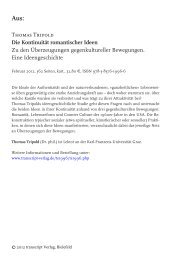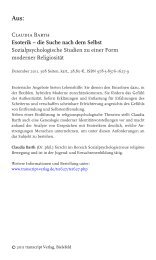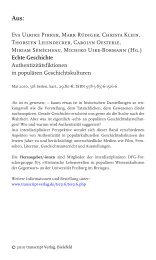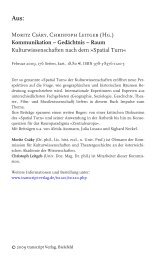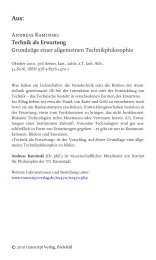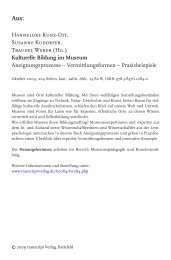Julia Straub (ed.) Paradoxes of Authenticity Studies on a Critical ...
Julia Straub (ed.) Paradoxes of Authenticity Studies on a Critical ...
Julia Straub (ed.) Paradoxes of Authenticity Studies on a Critical ...
You also want an ePaper? Increase the reach of your titles
YUMPU automatically turns print PDFs into web optimized ePapers that Google loves.
AUTHENTICITY IN LITERARY AND<br />
CULTURAL STUDIES<br />
INTRODUCTION | 17<br />
As the Frey case suggests, authenticity in literary and cultural studies<br />
is hottest as a c<strong>on</strong>cept when people living <strong>on</strong> the margins <str<strong>on</strong>g>of</str<strong>on</strong>g> society or<br />
bel<strong>on</strong>ging to minorities are c<strong>on</strong>cern<str<strong>on</strong>g>ed</str<strong>on</strong>g>: trauma literature, post-col<strong>on</strong>ial<br />
and minority writing in general receive str<strong>on</strong>g interest in c<strong>on</strong>necti<strong>on</strong><br />
with authenticity and its crises. Us<str<strong>on</strong>g>ed</str<strong>on</strong>g> in positivist, evaluative c<strong>on</strong>texts,<br />
i.e. when referring to the object world, its meaning can be sober, even<br />
hard-<str<strong>on</strong>g>ed</str<strong>on</strong>g>g<str<strong>on</strong>g>ed</str<strong>on</strong>g>. Detecting a piece <str<strong>on</strong>g>of</str<strong>on</strong>g> forgery places authenticity am<strong>on</strong>g<br />
hard facts. A manuscript receives the seal <str<strong>on</strong>g>of</str<strong>on</strong>g> approval, or it does not. 4<br />
Seen from this normative perspective, authenticity can inde<str<strong>on</strong>g>ed</str<strong>on</strong>g> permit<br />
very c<strong>on</strong>crete judgements within an empirically secur<str<strong>on</strong>g>ed</str<strong>on</strong>g> framework,<br />
challeng<str<strong>on</strong>g>ed</str<strong>on</strong>g> as it may obviously be by forgery and fraud. This is its<br />
promise <str<strong>on</strong>g>of</str<strong>on</strong>g> crystalline solidity that we seek and cherish. However,<br />
things are different when authenticity touches up<strong>on</strong> the human realm.<br />
<str<strong>on</strong>g>Authenticity</str<strong>on</strong>g>, then, becomes an emoti<strong>on</strong>al minefield and very messy.<br />
The reas<strong>on</strong> for this is that narratives <str<strong>on</strong>g>of</str<strong>on</strong>g> experiences that could be most<br />
loosely describ<str<strong>on</strong>g>ed</str<strong>on</strong>g> as liminal are measur<str<strong>on</strong>g>ed</str<strong>on</strong>g> with a different set <str<strong>on</strong>g>of</str<strong>on</strong>g><br />
scales. Suffering – and there tends to be suffering in narratives told<br />
from the margins <str<strong>on</strong>g>of</str<strong>on</strong>g> society – unmasks the individual: we expect people<br />
in pain to be at their most vulnerable, nak<str<strong>on</strong>g>ed</str<strong>on</strong>g> and therefore authentic<br />
(Lethen 221). Looking at survivors’ tales, we do not expect postmodernist<br />
fireworks to go <str<strong>on</strong>g>of</str<strong>on</strong>g>f. This explains why the interest Western<br />
readers take in writings from the <str<strong>on</strong>g>ed</str<strong>on</strong>g>ge is sometimes both motivat<str<strong>on</strong>g>ed</str<strong>on</strong>g><br />
and sweeten<str<strong>on</strong>g>ed</str<strong>on</strong>g> by a nostalgic impulse. These texts compensate for the<br />
readers’ perceiv<str<strong>on</strong>g>ed</str<strong>on</strong>g> lack in their own lives, lives which appear to be<br />
depriv<str<strong>on</strong>g>ed</str<strong>on</strong>g> <str<strong>on</strong>g>of</str<strong>on</strong>g> first-hand experiences. Deprivati<strong>on</strong>, stigmatizati<strong>on</strong> and<br />
marginalizati<strong>on</strong> come to be seen as means <str<strong>on</strong>g>of</str<strong>on</strong>g> empowerment. To share<br />
the suppos<str<strong>on</strong>g>ed</str<strong>on</strong>g> authenticity <str<strong>on</strong>g>of</str<strong>on</strong>g> other people’s lives means aiming for the<br />
c<strong>on</strong>solati<strong>on</strong> prize, a compensati<strong>on</strong> for a lost signifier, origin or essence:<br />
“One <str<strong>on</strong>g>of</str<strong>on</strong>g> the characteristics <str<strong>on</strong>g>of</str<strong>on</strong>g> modernity is the belief that authenticity<br />
has been lost and exists <strong>on</strong>ly in the past – whose signs we<br />
4 Minimizing its relevance, Theo van Leeuwen has argu<str<strong>on</strong>g>ed</str<strong>on</strong>g> that authenticity<br />
is no l<strong>on</strong>ger thought <str<strong>on</strong>g>of</str<strong>on</strong>g> as an objective feature <str<strong>on</strong>g>of</str<strong>on</strong>g> socio-cultural producti<strong>on</strong>,<br />
instead “[a]uthenticity is about validity” (396).



